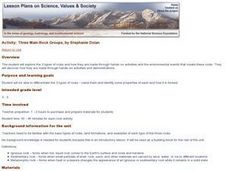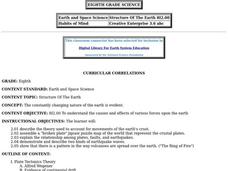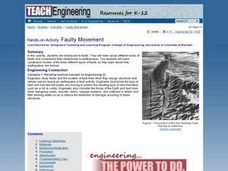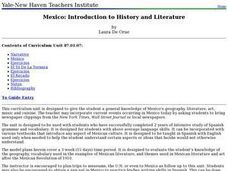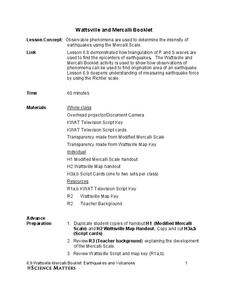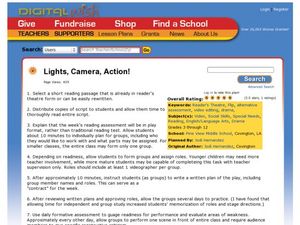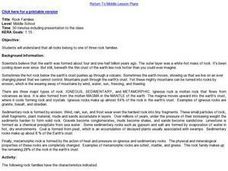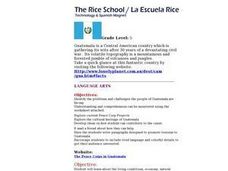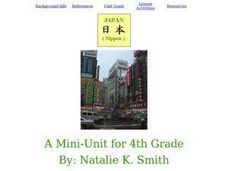Curated OER
Three Main Rock Groups
Students are introduced to igneous, sedimentary and metamorphic rocks. They use foods to demonstrate the basic formation of each type of rock, read books about rock formation and view related videos.
Curated OER
Structure of the Earth
Eighth graders examine the forces that are constantly acting on the Earth. They describe the theory of tectonic plates and demonstrate the two kinds of earthquake waves. They also examine the role of volcanoes in the structure of the...
Curated OER
Faulty Movement
Students discover the faults throughout the Earth. They describe the different types of faults and how they are related to earthquakes. They build models of the faults.
Curated OER
Exploring Landforms
Second graders discuss the different types of landforms throughout the world. They pick one and research and present it to the class.
Curated OER
Extreme Weather!
Students create a web page explaining a specfic type of extreme weather and identify recent examples of the weather occurance. They form small groups to research the weather type and build an HTML word document to share with classmates...
Curated OER
Landforms Slideshow
Students identify twelve different types of landforms, and create a slideshow about each landform that includes a title, pictures, definitions, conclusions and a reference page.
Curated OER
Rock Cycle
Third graders identify various types of landforms of the United States. They discuss earth movements that produce geologic structures and landforms and define cycle as it relates to rocks and soil. They demonstrate the processes forming...
Curated OER
Mexico: Introduction to History and Literature
Students study the geography of Mexico (i.e. major cities, surrounding countries and bodies of water, mountain ranges, rivers, volcanoes), They take turns reading aloud information provided (xerox copies) about Mexico. After each...
Curated OER
Worksheet 3 Vocabulary Review: Words That Mean the Same
In this synonyms instructional activity, students read 10 sentences and analyze the word in bold type. From two choices, students circle the letter of a word or phrase that means the same.
Curated OER
Aerosol Science
In this aerosol activity, students are given data for volcanic eruptions and the average temperatures of the Earth. They determine the change in temperature from the year of the eruption to the present year and use the means to determine...
Science Matters
Earthquake Waves: Wave Notes
A multi-part lesson opens with a review of p waves and s waves. Then scholars use a simple s wave simulator to view the way the wave travels. Next, pupils use cups and various fluids to simulate p waves moving through different mediums....
Science Matters
Wattsville and Mercalli Booklet
There has been an earthquake! Can you listen to the description of damage given by callers in order to determine the epicenter? The 11th of 20 lessons has pupils read a script of one emergency caller. The class records the information on...
Curated OER
Lights, Camera, Action!
Young scholars add various types of multimedia to a website they have created about volcanoes. They review what would best enhance their website and determine what the value and cost be in adding that particular piece of multimedia.
Curated OER
Rock Families
Students study the three types of rock characteristics; igneous, sedimentary, and metamorphic. They are divided into three groups and each group takes one of the rock characteristics. They then act out the characteristics of their rock...
Curated OER
Observing, Describing, And Identifying Contrails
Students compare the three types of contrails that are produced by aircraft exhaust. They examine pictures of contrails on the internet to classify each as short lived, persistent or persistent spreading. They then sketch examples in...
Curated OER
Guatemala
Fifth graders explore what types of projects the Peace Corp is doing to help Guatemala.
Curated OER
About to Explode
Young scholars explore Mount St. Helens' quiet eruption of 2004-2005. They examine different types of eruptions and then present creative first-hand accounts of different volcanic eruptions in history.
Curated OER
Water 1: Water and Ice
Students explore the states of water. In this science lesson, students use observation, measurement, and communication skills to describe water as it changes from a solid to a liquid.
Science Matters
Slip Sliding Along
The San Andreas Fault is the largest earthquake-producing fault in California. In the seventh lesson in the 20 part series, pupils create maps of California, focusing on the San Andreas Fault system. The comparison of where California is...
Science Matters
Fault Formations
The San Andreas Fault moves about two inches a year, approximately the same rate fingernails grow—crazy! The third lesson in the series allows for hands-on exploration of various fault formations. Through the use of a Popsicle stick,...
Science Matters
Spaghetti Fault Model
Does increasing the pressure between two moving plates provide a stabilizing force or create more destruction? The hands-on lesson encourages exploration of strike-split fault models. The sixth lesson in a 20-part series asks scholars to...
Science Matters
Finding the Epicenter
The epicenter is the point on the ground above the initial point of rupture. The 10th lesson in a series of 20 encourages scholars to learn to triangulate the epicenter of an earthquake based on the arrival times of p waves and s waves....
Curated OER
Social Studies: Exploring Japan
Fourth graders examine the culture and environment of Japan, beginning with a KWL chart. They use clay and cups of water to construct representations of the Japanese Islands. After designing flags representing farming and food, 4th...
Curated OER
Earthquakes: Third Grade Lesson Plans and Activities
Introduce third graders to energy waves with a hands-on geology activity, in which they answer questions and compare seismograms in the San Francisco Bay area. After a demonstration that shows how bigger waves indicate a high-intensity...
Other popular searches
- Three Types of Volcanoes
- 3 Types of Volcanoes
- Different Types of Volcanoes
- 4 Types of Volcanoes
- Volcanoes Types


